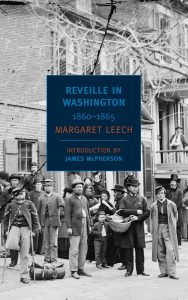Reveille in Washington
Women’s History Month is barreling toward us and I am happily working on bringing you another March full of mini-interviews with people who are doing interesting work in women’s history. In the meantime, I’m sharing some of the books that I’ve rediscovered in the process of finding room on my office shelves for the books I used in writing The Dragon From Chicago. (The danger with this is the temptation to re-read the books as I go. Which wouldn’t be a problem if it weren’t for all the as yet unread books piled throughout my office.)
Next up, Reveille in Washington, 1860-65 by Margaret Leech
Reveille in Washington was published in 1941. It became an immediate best seller, won the Pulitzer Prize for History in 1942,** and has remained a classic work of Civil War history ever since. If you know a serious Civil War history buff, they probably have a copy on their shelves.
Reveille in Washington is not an account of battles and generals. Instead Leech focuses on the war through the lens of the capital, looking at its politics and its people.
The book opens with a character sketch of the American army’s aging. overweight commanding general, Winfield Scott— the chapter title notes “The General is Older than the Capital”—who was emblematic of the army at the outbreak of the Civil War. The book is larded with similar portraits, often witty and always insightful, of characters who peopled Washington over the course of the war: General George McClellan, Frederick Law Olmstead, Andrew Carnegie, Clara Barton, Walt Whitman and Louisa May Alcott among others. Leecch claimed that she tried to keep Lincoln out of the book because it was the story of Washington. Late in the writing, she realized “that was like doing a book about the disciples and not mentioning whose disciples they were.” She had to go back and insert Lincoln into her story.
But the primary character in the book is Washington, D.C., itself, which was in many ways a frontier town despite its location. Leech describes it as “an idea set in wilderness.” In 1861, the city was unfinished, filthy, and famously corrupt. One Union soldier, who arrived to guard Washington in the first days of the way grumbled that the city was “hardly worth defending, except for the éclat of the thing. Reveille in Washington is at heart the story of how the city shaped the conduct of the war and was shaped by the war in turn, from an unfinished administrative backwater to the true center of federal power. It is also a thumping good read. Leech wrote several novels before she turned to history and it shows. She knows how to tell a story.
*Leech won a second Pulitzer in 1960 for In the Days of McKinley, which also won the Bancroft Prize in American History and was a finalist for the National Book Award. She remains the first person and only woman to win two Pulitzer Prizes for History. ** It is perhaps not coincidental that Leech was married to Ralph Pulitzer, whose father had established the awards. Nonetheless, the fact that the playing field is never entirely flat does not change the fact that Reveille in Washington is a great book.
Leech was also a sharp-tongued member of the Algonquin Round Table, which came as a surprise to me. Turns out that more women were members of the vicious circle than I realized: https://algonquinroundtable.org/6-women-you-didnt-know-were-members-of-the-algonquin-round-table/
**Barbara Tuchman won two Pulitzer Prizes for General Non-Fiction, for The Guns of August in 1963 and Stillwell and the American Experience in China in 1971. But I digress.
###
I mentioned before The Dragon From Chicago is now available for pre-order wherever you get your books. If you want a signed copy, you can order it from my neighborhood book store, the Seminary Coop Bookstore at this link: There is a space at the bottom of the order page to add special instructions. Request a signed copy there, and specify how you want the book to be signed. (I’m afraid there’s going to be a certain amount of “My Book, My Book!” going forward. Sorry, not sorry.)





